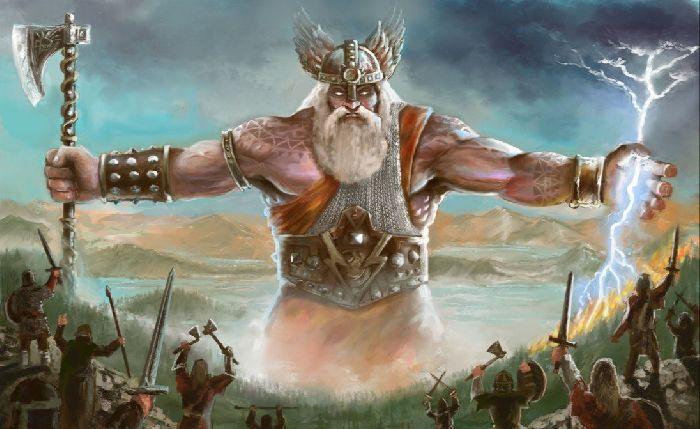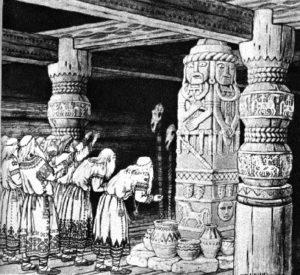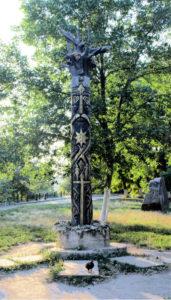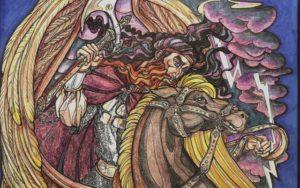
Perun
Slavic Mythology
Greek and Roman mythologies are so prevalent in Western culture that most people have never heard of a pantheon of gods from other cultures. One of the least known is the Slavic pantheon of gods, spirits and heroes, worshiped before the advent of Christian missionaries. ... Well-known mythology has two key differences from well-known Greek and Roman myths. First, many ghosts are still part of the general images and folklore of the Slavic peoples. Secondly, the old Slavic pantheon of gods is poorly documented, so scientists are trying to recreate information from secondary documents. Most of the information about the Slavic gods, traditions and customs, unfortunately, is only an assumption. Despite this Pantheon of Slavic gods it's fun and worth knowing.

Most of the information about the Slavic gods, traditions and customs, unfortunately, is only an assumption. Source: wikipedia.pl
Who is Perun?
Perun - of the entire pantheon of Slavic gods, he is most often found. We can find references to him in ancient Slavic texts, and his symbols are often found in Slavic artifacts. According to the interpretation of the genealogy of Slavic deities, Perun's wife is Perperun. They have three sons (very important for the Slavs): Sventovitsa (god of war and fertility), Yarovitsa (the god of war and victory - a horse was sacrificed to him before the campaign) and Rugiewita (also the god of war. Rugevit had 2 sons: Porenut and Porevit). For the ancient Slavs, Perun was the most important god of the pantheon. The name Perun goes back to the proto-European root * per- or * perk, meaning “hit or hit”, and can be translated as “He who strikes (He who smashes)”. In fact, the name of this ancient god has survived in Polish, where it means "thunder" (lightning). Perun was the god of war and thunder. He drove a cart and had a mythical weapon. The most important was his ax, which always returned to his hand (possibly borrowed from the Scandinavian god Thor). Because of his epic nature, Perun has always been portrayed as a muscular man with a bronze beard.
In the mythology of the Slavs, Perun fought with Veles to protect humanity and always won. He eventually threw Veles (the sign of Wales) into the underworld.
Cult Peruna

Cult of Perun Image source: wikipedia.pl
In 980, the Grand Duke of Kievan Rus Vladimir I the Great he erected a statue of Perun in front of the palace. Some researchers believe that the cult of Perun in Russia arose as a result of the cult of Thor, planted there by the Vikings. As the power of Russia spread, the worship of Perun became significant in Eastern Europe and spread throughout Slavic culture. This is evidenced by the words of Procopius of Caesarea, who writes about the Slavs: “They believe that one of the gods, the creator of lightning, is the only ruler of everything, and they sacrifice oxen and all other animals to him. "
It is likely that the cult of Perun took different forms and names depending on where he was worshiped in the vast expanses of Slavic Europe. An old Russian proverb says: "Perun - plural"
When Christians first came to Russia, they tried to dissuade slaves from joining pagan cults. In the East, missionaries taught that Perun was the prophet Elijah, and made him a patron saint. Over time, the features of Perun became associated with the Christian monotheistic God.
Perun today

Perun is one of the famous Slavic gods.
Graphics source: http://innemedium.pl
Currently, one can observe back to the origins of Slavic culture... People are increasingly interested in the history of their ancestors, especially pre-Christian ones. Despite many hundreds of years of attempts to erase Slavic beliefs and customs, an attentive observer can see many elements of this culture that have survived to this day. Most are just words like lightning, but they can also be local traditions that are still cultivated. Not so long ago, in some regions of Poland, during the first spring storm, people beat their heads with a small stone in respect of thunder and lightning. It was also believed that a person struck by the Perun Thunder was immediately noted by the god Perun himself. All trees struck by lightning were sacred, especially such a symbol there were "marked oaks"... The ashes from such places had a sacred nature, and eating it gave such a lucky person many years of life and the gift of fortune-telling and fire spells.
Perun is celebrated on July 20. indigenous Slavic believers, both on behalf of local religious associations registered in Poland and informal communities, as well as in other Slavic countries; incl. in Ukraine or Slovakia. During the celebration in honor of Perun, sports competitions are held, during which men compete with each other in selected disciplines.
So we can say that Perun, the greatest god of the Slavs, has survived to our times.
Leave a Reply